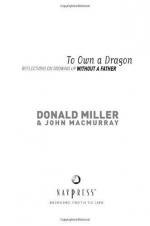
|
| Name: _________________________ | Period: ___________________ |
This test consists of 15 multiple choice questions and 5 short answer questions.
Multiple Choice Questions
1. According to Miller, another necessary characteristic of God's love that is required in father-son love is the ability to do what?
(a) Make decisions for humans.
(b) Punish people.
(c) Forgive people.
(d) Make people well.
2. Miller found the characteristics of a strong male authority figure in whom?
(a) His boss.
(b) John MacMurray, his mentor.
(c) Politicians.
(d) David Gentiles.
3. Who teaches this church class that Miller attends in Boring, Oregon?
(a) The minister of the church.
(b) John MacMurray.
(c) Mr. Kilpin.
(d) David Gentiles.
4. What does Miller do that upsets one of the church members who is spending time with Miller?
(a) Makes rude noises during youth group meetings.
(b) Uses rude language during youth group meetings.
(c) Goes to sleep during church.
(d) Has a mishap with the remote-controlled airplane.
5. As a child and adolescent, who does Miller resent?
(a) Rich people.
(b) Friends who had fathers.
(c) Fathers who left their families.
(d) Authority figures.
6. Why does Miller grow up feeling insecure?
(a) Because he does not have money.
(b) Because there are no males around him.
(c) Because he does not believe that he fits into male society.
(d) Because he does not like himself.
7. According to Miller, what lesson is a father responsible for instilling in a young child?
(a) The difference between right and wrong.
(b) That the world is unfair.
(c) That the child is worthless.
(d) That the child's existence makes an impact in the world.
8. Miller writes specifically to appeal to what type of humor?
(a) A female sense of humor.
(b) Everyone's sense of humor.
(c) The author does not write with a sense of humor.
(d) A male sense of humor.
9. The author uses the prologue to do which of the following?
(a) Tell the reader his life story.
(b) Discuss issues related to fatherless boys.
(c) Discuss issues related to fathers who abandon their children.
(d) Explain his writing style.
10. In Chapter 4, as Miller thinks about his pain as child without a father, what happens to him?
(a) He begins to heal.
(b) He gets sick.
(c) He feels sad.
(d) He gets angry.
11. Who gives Miller the key to his new home?
(a) Cassie MacMurray.
(b) Terri MacMurray.
(c) Elle MacMurray.
(d) John MacMurray.
12. What does Miller state that the dragon reminds him of?
(a) Freedom.
(b) A real father figure.
(c) Power.
(d) A giant protector.
13. Who is Miller's intended audience?
(a) Men.
(b) Women.
(c) Boys only.
(d) Men and women.
14. What is the reason that Miller gives for failing to find positive male influences in his life?
(a) His insecurity.
(b) He does not give a reasonn.
(c) His immaturity.
(d) There were none around.
15. As a child, Miller remembers hearing fairy tales about which animals?
(a) Monsters.
(b) Dwarves and dragons.
(c) Angels.
(d) Witches.
Short Answer Questions
1. How does Miller make up for not having a father to give him information?
2. What happens to elephant's behavior when they reach puberty?
3. Miller also remembers watching a documentary on what animal?
4. Miller asks for what from the reader?
5. What audience does Miller address in Chapter 6?
|
This section contains 540 words (approx. 2 pages at 300 words per page) |

|




